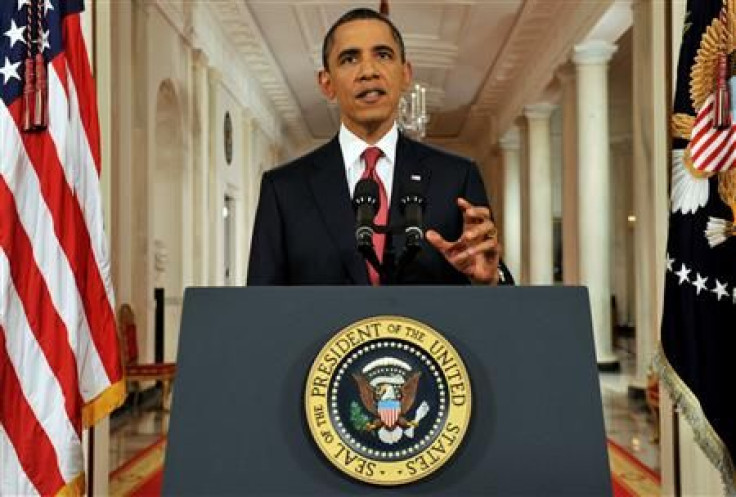Debt crisis sends first waves through Wall Street

President Barack Obama's Democrats and their Republican rivals were further apart than ever on Tuesday in an impasse over America's debt limit as Wall Street braced for a looming U.S. default and credit downgrade.
One week before a deadline to act, the two sides pursued competing budget plans that appeared to have little chance of winning broad congressional approval. There was no compromise in sight to raise the nation's $14.3 trillion debt ceiling by August 2 to avert a default that could trigger global financial chaos.
With politicians in Washington starkly at odds, corporate America was growing increasingly nervous.
Credit rating agencies have threatened to cut America's top-notch AAA bond rating if an increase in the debt limit is not accompanied by a plan for controlling long-term deficits. Such a deal seemed increasingly unlikely to emerge from political brinkmanship in Washington that has bordered on dysfunction.
A default and downgrade could push the United States back into recession and send shock waves through global markets.
Wall Street banks are preparing for the real possibility that the United States will lose its top credit rating, which they say will cost the country $100 billion in additional interest payments and hurt both consumers and the economy.
"That's a negative for growth," Mike Hanson, senior U.S. economist at Bank of America Merrill Lynch, told reporters on a call organized by a Wall Street trade group, the Securities Industry and Financial Markets Association.
"That's an environment where hiring is going to be much less likely than it otherwise would be," he said.
The stalemate in Washington is already having an effect, with investors starting to take cash out of the market and shifting away from some long-term investments.
Further underscoring the risk of government inaction, United Parcel Service Inc, the world's largest package delivery company, cited stalled U.S. debt ceiling talks as a reason for business uncertainty in its quarterly earnings report. Its shares fell nearly 5 percent.
The continuing gridlock unnerved investors worldwide. U.S. stocks and the dollar fell while gold hovered near record highs. There was no hint of panic, however, as markets held out hope the stalemate could still be broken.
A Reuters poll showed that 30 of 53 economists surveyed over the past two days said the United States will lose its AAA credit rating from one of the three big ratings agencies -- Standard & Poor's, Moody's or Fitch. Most said the wrangling over debt already has damaged the economy.
SOUR TONE
The tone in Washington was sour after Obama and House of Representatives Speaker John Boehner, the top Republican in Congress, delivered dueling televised addresses late on Monday and gave no ground in the bitter debate over how to raise the limit on America's borrowing before the world's biggest economy runs out of money to pay its bills.
Republicans control the House and Obama's Democrats control the Senate.
Boehner on Tuesday kept up efforts to rally support for his plan, which could come to a vote in the House on Wednesday.
He is pushing a two-stage deficit cut plan that would start with an initial $1.2 trillion in savings over 10 years. Obama opposes it because it would raise the debt limit for only a few months, something he has said he will not agree to.
But passage is seriously in doubt because of opposition from fiscal hawks in the Republican camp aligned with the conservative Tea Party movement -- the very group insisting on no increase in tax revenue and no compromise with Obama. Those lawmakers argue that Boehner's proposed spending cuts are not deep enough.
While Boehner insisted his plan can pass, the chief Democratic vote counter in the House, Representative Steny Hoyer, said "very few" Democrats would back Boehner's plan.
White House spokesman Jay Carney said Boehner's bill would never reach Obama's desk. Carney also said he expects a default to be averted.
"We don't believe we will get there," Carney said of default. "We are pushing this to the last minute, and that should not be in the case, but in the end we believe Congress will act appropriately."
Boehner will not have enough Republican votes to pass his budget plan through the House without Democratic support, a leader of the chamber's conservatives said.
"I don't have an exact count, but I do not believe there are 218 Republicans supportive of it right now," said Representative Jim Jordan, who heads the Republican Study Committee, a group of more than 150 conservative and Tea Party-aligned lawmakers.
Obama's Democrats have presented their one-step plan for $2.7 trillion in deficit reduction over the next decade but with a debt limit hike that would carry through the November 2012 elections, when he is seeking a second term.
Senate Majority Leader Harry Reid, a Democrat, is expected to hold off on a vote on the plan until the House takes up Boehner's proposal.
The White House said invoking language of the U.S. Constitution's 14th Amendment -- a move some experts have cited as a possible way of the crisis without congressional action -- was "not available" to Obama to avoid the August 2 deadline to raise the debt ceiling.
"There are no easy ways out here. There are no tricks, there is no citing of the Constitution that suddenly allow us to borrow," Carney told reporters. "It's not available."
© Copyright Thomson Reuters 2024. All rights reserved.











